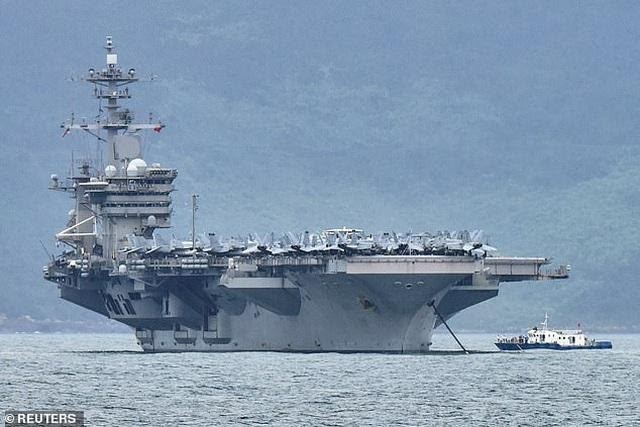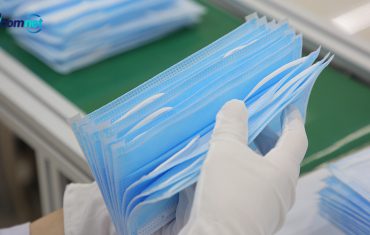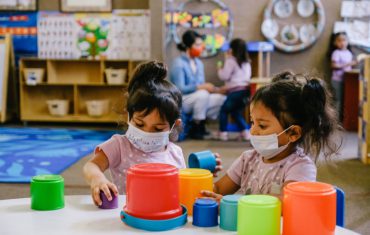Face masks are the best protection against Covid-19, more than hand washing or social stretch, a study on the American battleship Theodore Roosevelt showed.

US battleship Theodore Roosevelt was killed by corona virus
More than 1,000 of the nearly 4,900 crew members of the ship were Covid-19 positive during the March outbreak, causing one death and the captain’s dismissal. .
This aircraft carrier has been studied by the US authorities to better understand how the virus spreads.
They found a 25% difference in those infected between people with and without a mask.
This difference was compared with the rate of 15.3% of social gap and 3% of hand washing, measures considered the most important measures to prevent the spread of the virus.
The conclusion came after months of debate among scientists about whether to recommend wearing a face mask to the public due to weak evidence of the effectiveness of this practice.
Some experts say there is no harm in adding an extra layer of protection and have pushed the rules even stronger.
The British government eventually surrendered to the pressure and declared British people obliged to wear face masks on public transport.
The Roosevelt docked at the port of Guam on 27 March, with the number of virus-positive sailors rapidly increasing. It is not clear how the virus got on board.
One crew member died of the corona virus and another was hospitalized.
Ten weeks later, the ship returned to sea and is conducting military operations in the Pacific.
In April, the US Navy and the Centers for Disease Control (CDC) investigated the service on a sample of 382 service personnel (27%) on board, most of them young, healthy.
CDC also conducted research on the USS Kidd – the second US warship to have an outbreak of corona virus.
Research shows that outbreaks occur due to widespread transmission among members who have mild symptoms or no symptoms.
“Those who reported taking preventive measures had lower rates of infection than those who did not report taking these measures,” the study found.
The greatest protective effect is seen in people wearing a mask.
Only 55.8% of those wearing a mask were infected compared with 80.8% of those who did not – a difference of 25%.
Interval reduced infections by 15.3%, with 54.7% of those taking this being infected compared with 70% of those who did not.
Wearing a mask was also found to be more effective than increasing hand washing.
About 62% of those who regularly wash their hands are infected compared with about 65% of those who do not wash their hands often – a difference of 3%.
The authors of the study stated: “This report improves understanding of COVID-19 in the US military and among young people in concentration facilities and reinforces the importance of preventive measures. to reduce the risk of infection in similar environments. ‘
The above statement came after months of fierce controversy about whether to recommend people to wear face masks in the context of a lack of surgical face masks for medical staff.
In May, the government said British citizens should “wear homemade, fabric or other face masks in enclosed spaces, where it is not always possible to distance society.”
Guidelines were issued by the CDC to Americans in mid-April.
The World Health Organization (WHO) says widespread use is not necessary – only health-care workers and people at high risk or with symptoms should wear face masks.
There is also concern that face masks may be missing for health workers if people rush to buy them.
Scientific articles submitted to the SAGE committee of the British government at the beginning of the pandemic show that British scientists do not argue much about face masks.
Articles as of mid-April say there is little or inconsistent evidence in favor of wearing a mask, and much of the research has nothing to do with British society.
But now, wearing face masks on public transport in the UK is mandatory.
Transport Minister Grant Shapps, who made the announcement on June 4, said: “For many people using public transport, the evidence shows that covering up offers protection – albeit the term – against the spread of the virus”.
The UK government does not believe that face masks are useful in other situations and believes they can be harmful by giving people the false confidence to take unnecessary risk.
However, a study last week found that widespread use of face masks in the UK could keep transmission rates below 1 and prevent a second wave of corona virus.
The lead author, Dr. Richard Jonathan, from Cambridge University, said: ‘Our analyzes support the immediate and widespread wear of face masks by people.’
Professor John Colvin, co-author from the University of Greenwich, said: “There is a common perception that wearing a mask means you view others as dangerous.
“In fact, by wearing a medical mask, you are essentially protecting others from yourself. Cultural and political issues can prevent people from wearing face masks, so the message needs to be clear, “My mask protects you, your mask protects me”.
“In the UK, the mask approach should go further than public transport. The most effective way to re-start daily life is to encourage people to wear face masks whenever they are in public.
Along with considering the strength of the protective measures, the CDC study on board Roosevelt also found that nearly two-thirds had a positive antibody test, suggesting they were fighting the virus.
Before that, all 4,800 sailors aboard Roosevelt were tested and about a quarter positive.
But serological tests – to look for the presence of specific antibodies in the blood – reveal more infections that go unnoticed.
Similar tests in Italy and elsewhere have shown the presence of antibodies in previously non-positive people, giving a more accurate sense of the viral spread.
However, serological tests also revealed that those who tested positive for coronavirus did not subsequently carry antibodies, posing questions about immunity to the virus.
While the results may indicate a much higher presence of the virus, a Navy official said that may not be true due to the way the study is conducted. “The outbreak investigation does not include the entire crew and the results of this study cannot be generalized to the entire crew,” the officer said.



